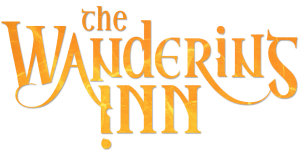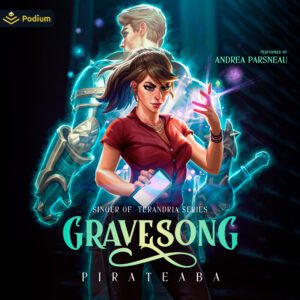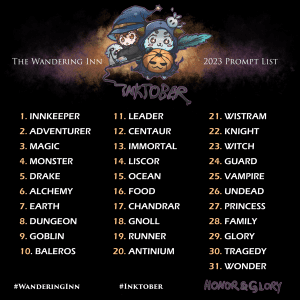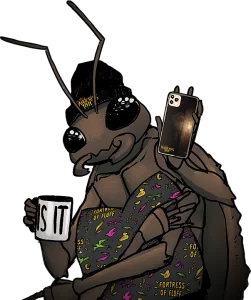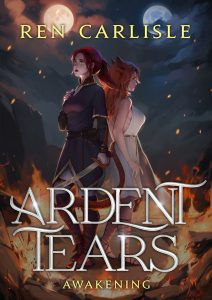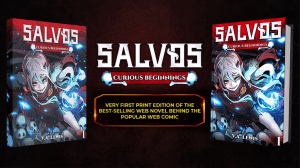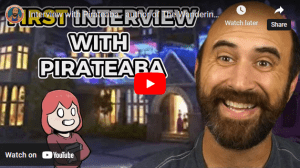It is late. I have just finished God of War: Ragnarok, part of the new series following the 2016 game. I believe I was about 31 hours in before the final parts, which means I’ve probably finished the game at ~36 hours on the ‘Give Me Balance’, Normal difficulty.
I’m pirateaba, author of The Wandering Inn and I am going to write down my thoughts on the story. I don’t know when I started taking notes…I think about a few hours into the story. I felt like I had to, and I’ve reached about 4.3 thousand words, which I’ll translate into an essay.
My TL;DR is simple: This is possibly the worst story I’ve played in a video game in a long time. I will say the game itself, the combat, my enjoyment of the first one, led me to wait for the release, and I did enjoy a lot of the game–just not the story. I am uncertain what the full player reaction will be since only game reviews from large sites like IGN are out there and their opinions are worthless.
Of the streamers I’ve seen, only Ludwig has beaten the game as of me on 11/14/2022, and his reactions somewhat mirrored mine from the few minutes I browsed of him at the ending. But I am also someone who enjoys stories in games, and so I have a lot of thoughts. For the full recap of my notes I’ll try to go by plot points and characters, and there will be ALL the spoilers below.
Once more, I’d say that when people talk about games, they talk about parts. I think God of War: Ragnarok had amazing voice acting, set and character design, and so my focus is only on the plot and overall game design. Quite like Last of Us 2, which I disliked intensely for the story, I enjoyed God of War: Ragnarok’s game–until the cutscenes began.
And I did enjoy it a lot at the start. But flaws crept in the more I played, and I think it’s mostly pronounced at the end.
Let’s start with the hugest plot summary of this game. Kratos is doomed to die after God of War 2016, and Ragnarok is coming. Atreus, or Loki, is fated to be part of that end of the world, so this game is about them trying to avert/make the prophecy come true.
Antagonists: Thor and Odin and Asgard. Protagonists? Kratos and Loki, their allies among the nine realms, and in the trailers, Tyr, the God of War in Norse legends, who is part of this end of days for Norse mythology. Also, a mysterious girl maybe talking about Loki’s destiny.
Freya, the goddess who was an ally in game one, is now vengeful due to killing Baldur, her son. Let’s begin with Freya.
Freya: In the first game, Freya was set up as the helpful figure who does the magic. She saves Kratos and Atreus, and later on is pitted against them because Baldur is her son. In game two–she’s angry because you killed Baldur, who was about to strangle her to death.
Weird, but okay. Here’s a problem with Freya: she first comes into Ragnarok trying to seek vengeance. She is the grieving mother, which is a stereotype. I had issues with her in the original game being blindly loving of her son.
Yes, parents love children, but he, uh, is also trying to murder Atreus. And Kratos. And he’s killed a lotta people. But let’s assume she loved him. She goes blind with rage after Kratos. Oh–and she’s also Odin’s former wife, and is haunted by the marriage and her abusive relationship. Plus, in this game she’ll meet Freyr, her brother, who she also has to forgive for his past…somethings.
My problem with Freya is that she’s defined by her relationships with her son, her husband, and her brother. Uncharitably–and I was trying not to be–she’s just archetypes. The vengeful widow, the war queen, the mother who lost a son–and the estranged sister. She also, during her personal arc where you convince her to become your ally once more, forgives Kratos for murdering Baldur. As one might, but Freya to me was forced into a lot of things as the plot dictated. She had an entire Fimbulwinter to be the nemesis of Kratos and Atreus (mostly offscreen), but over the course of one adventure decides to finally ‘not forgive’ him but journey with him.
After which she makes snarky comments to Kratos a lot, but never really says Baldur’s name again. It’s convenient. What I’m trying to say is, the original 2016 God of War never did Freya that well. She was obsessed with protecting Baldur, aforementioned ‘kill everyone sociopath’, and her character is not better in this game. She’s obsessed with harming Odin, and the writing also implies she’s a survivor of abuse, if not explicitly physical, her side-quest is about reclaiming herself after being Odin’s wife.
One of the things I don’t like about Freya’s resolution with Kratos is that for a game about emotions, him being a father for one thing, the depth of her anger over her son’s death is almost gone when she becomes your ally. Because…grief works like that?
She never has a moment, later on, where she brings up Baldur again other than in fairly impartial dialogue where Kratos keeps poking her about his choices. Never once does she have another emotional outburst. Once she forgives him, she never snaps about it, not once. And again, if I kill someone’s son, I expect that. What’s done is done.
It’s NPC-like behavior. To be fair, movies do this badly too–the grieving process of a character is often accelerated, but it’s bad writing for emotions and a character to have depth. Death is not something you get over once. It returns at bad moments, it haunts you. If Freya cared about Baldur (and I still think it’s a bad point), she should continue to be consistent there, even see Baldur in Atreus.
These are tropes. Not good tropes or bad tropes, but clichés in character writing. I’m bringing Freya up first because, as she is, I’d overlook her and not write an angry essay. But I’m pointing it out as a symptom.
The World: In the course of journeying through the Nine Realms of Norse Mythology, we get to see a lot of places. Not a lot of people, but a lot of places. Actually, not a lot of places. Each realm has a few giant maps, and you go around them killing monsters and looting treasure chests and solving puzzles.
Of the people–you can see a few Dwarves in one realm. You can see…raiders…who attack you. In Asgard, you see mostly warriors and a few Midgardians who are implied to have escaped there.
The world is cramped and narrow. It’s mostly fight-to-fight with puzzles or dialogue when you’re boating in the open world segments to fill the gaps. That’s okay for a fighting game, but I thought while playing that the end of the Norse world has about 100 people in it.
Part of this is excused by the plot–all the Dwarves hide. The Elves are at war, etc. But the consequence of not showing us more than the main-side-character is that the realms feel empty and boring. The end of the world? What world? I suspect the game devs just didn’t want to pull a budget making a bunch of NPC’s that Kratos wouldn’t interact with, but the consequence is this:
When we survive the longest winter, when we go places, and when the protagonist, Atreus, talks about saving the world (and we’ll get to Tyr and that), it’s implied we’re saving huge groups of people who have been under attack by Odin’s tyranny. Also, that the end of the world, Ragnarok, might kill a bunch of people.
We see none of them. So when Tyr tells us that Ragnarok will ‘result in untold deaths’, we have no context for anyone. When we meet the last Vanir resistance and all six of ‘em are holding out against Odin’s forces…who are they protecting? It doesn’t add to the main conflict of the game, but that has other issues. Like Atreus. And Atreus. And mostly Atreus.
The Prophecy/Ragnarok/Tyr: In God of War 2016, we know Kratos is doomed to die helping Atreus in Ragnarok. He does it anyways, which is good background tension for us, the player.
Atreus, though, wants to be the ‘Champion’ who saves the world and defeats Odin, or at least, find Tyr. Wow, does he talk about it a lot.
When that’s the part of the game–the start–all he says in all the dialogue is ‘save Tyr’. There’s an entire mine-section where every time you clear a room, he talks about whether Tyr is going to be in the next room.
Until we find Tyr, every single piece of dialogue is about that. Which is fine–he’s meant to be a bit annoying. He’s a kid who wants to be the hero, but the dialogue really hammers in the next plot point sometimes. If you play through the game, just listen to how many times that’s all Atreus says.
But I digress. When we get to Tyr, at the beginning, the interesting thing I noticed is the gap between the trailers and the game.
In the trailers, Tyr looks like he’s the God of War to lead armies. In the trailers–Odin and Thor are menacing, and I will say, every single cutscene in the trailers plays out one-to-one. It’s just that the trailer’s message of how Tyr reacts and how the game shows him are wildly, wildly different.
The nuance might be lost on an audience long after God of War: Ragnarok is out, but if you compare the trailer of first meeting Tyr, it, uh, doesn’t show him running for the hills like a coward. I’m bringing this up because the expectation doesn’t meet reality, and I wonder if the subversion was intentional.
The point is, though, that Tyr also sucks because he’s written as the pacifist with no compromise. There is an in-game reason for this at the end, which we’ll get to, but the point about Tyr–and story elements of this game like freeing the whale, or their deliberations about whether ‘war is right’ in the Alfheim sections are, uh–bad.
It’s just bad philosophy. Tyr makes a lot of points about there being no right side in the war between the dark and light Elves, which is an analogy that cannot be applied to anything else. It’s also backed up by him pointing out the cost of war, often to Kratos, the God of War, who kills people.
You know what I notice in all these asides between fights where they talk about that and bring up the morality of…God of War? Kratos never really engages in debate. One side says something that sounds smart-ish, and they move on because the next combat encounter begins.
Tyr says what a lot of generic pacifist characters say as you helpfully do all the combat for him. Again, you can say he’s written like that for a reason, but the moralizing of Mimir as he looks upon the whale you free ‘but can never really be free’ because it’s conditioned to accept its chains? That side quest ends with Atreus claiming we’ve done something but that the whale is forever still shackled by what was done to it.
It’s…a really weak point. In fact, there is no point. The Light-Dark Elf war we fight through goes on without really a reason other than they’re fighting over the Light of Alfheim. Kratos and Tyr and Mimir tell Atreus no side is right, and that is, apparently, wisdom.
They don’t discuss whether trying to halt the war might be right. Just that taking a side in this bloody conflict isn’t their job. Which isn’t wisdom, it’s just non-interventionism. It’s not clever.
However, and once more, these are still comparatively minor gripes. My main feeling that the game is really bad comes at a turning point in the story. Tyr is back but he’s useless, and no one knows quite what to do. So Atreus goes to sleep–and wakes up in a mysterious realm.
And there, to meet him, is Angrboda. And that’s when I got really upset.
Angrboda/Loki the Chosen One: Chosen one stories aren’t inherently bad. But they are common, one could say too common in fantasy stories and other tales, and they are very, very hard to do well.
Harry Potter is a famous example of the chosen-one story. Harry Potter is famous, regardless of anything else. Loki, similarly, is the chosen one of God of War: Ragnarok. And he exemplifies all the worst qualities of the genre. Angrboda is another example of it.
Bad chosen one writing is very simple to see. It’s where the main character can do nothing wrong. Where the plot bends over for them, and they happen to get anything and everything they could want. I write in web serials, a genre that has an intersection with the ‘isekai’, portal fiction, genre. It is famous for characters like this, who are chosen by fate.
For instance, such characters seldom lose battles. They are lucky and gain all the blessings in the world. Oh, and they happen to meet a lot of beautiful women (they’re mostly male), who fall in love with them.
It’s…odd to find Angrboda appear in the game, the mysterious magic-using girl who knows Loki in prophecies. She’s quirky, does magic stuff, and has a lot of pets. She’s generic–and one of three characters who aren’t white (or blue like Brock), in the entire game, I think.
Oh, and she’s already predisposed to like Loki because her destiny and his are intertwined. In fact, Thrud, another character, also seems to really hit it off with Loki despite him killing her brothers the moment we meet her.
That’s not bad in and of itself. But I note, of the characters Loki’s age with any voiced lines, two are female, one is a guy we see for 5 minutes total in the game, and the other two are semi-romantic leads even if that never goes to romance.
It’s not great. However, Angrboda could be part of the game, and let’s say she’s necessary to the plot. (She is not). You could introduce her earlier, or have her foreshadowed by peeking in on Kratos and Atreus, even helping them earlier in the game.
Foreshadowing is something else this game lacks, by the way. Foreshadowing, and pacing. Each time the game needs to change from plot point to plot point, it goes by fast. You’ll see this when the game is reaching its end–they convince Sutr, a character they don’t know, to sacrifice his life and start the end of the world in one…two cutscenes and a short walk. For a game which took me 30+ hours to beat, the plot gets condensed at times. It also leads into the worst part of the game.
Atreus Saving Kratos/Serving Odin: At one point, Atreus learns Kratos is going to die, and the narrative changes to being about saving Kratos. Only, Kratos doesn’t know Atreus knows, and Atreus begins helping Odin, and the two butt heads.
Classic story writing, by which I mean, bad, contrived writing. Neither character talks to each other because, if they did, they’d clear up the issue.
Loki goes from being obsessed with Tyr, to going to serve Odin, who is a maniac who’s killed an entire people of giants and is a tyrant who rules over all the realms and who we’ve heard about doing horrific things the entire game.
Loki goes to join him because he accidentally turns into a bear after shouting at his dad. The jump in logic from ‘I have had a fight’ to ‘I should join this guy who invited me after murdering my ENTIRE PEOPLE’ is bad. It could have been easier to fix by, say, Mimir telling Atreus to go to spy on Odin, which is a rationale later used, but they went with this reason.
I had a feeling at some point that the writers were not–revising–their story. All of this feels like a first draft of a story. If I’ve learned anything, it’s that you can take a story you wrote, and edit it. Smooth out problems and foreshadow events. This feels like the story was written in one go, and there was no revision. Which makes no sense–unless the game studio was making the game as the story was coming out and they could not change it dramatically.
Here’s some notes I had while playing that don’t fit into main character arcs but started to get to me:
The Norns: The fates have a small part of the main quest where they tell Kratos the plot–and make a lot of self-referential jokes. They reference a Midsummer’s Night Dream and have lines about the meta-nature of storytelling.
It’s cringe. It’s breaking the 4th Wall to pat yourself on the back about the plot and it was the worst section in the games until the end for me. The entire prophecy issue with the Norns is also just weak as a plot point. It happens that way becaus it has to happen. No one tries to threaten the fates, change things, bargain with them–and why wouldn’t they try?
Didn’t Kratos kill the fates in the Greek section of his legend? That’s definitely an option here if his son is in danger. The fates show up, tell him the next plot point, the writers high-five, and they leave. It did nothing but advance the plot and I hate it.
Macbeth: There’s also a line with Mimir and Kratos where they bring up Macbeth (or maybe it’s Hamlet), another story by Shakespeare about prophecy, and Mimir makes a smartass comment about it all taking place as news being broken to the audience. And how that’s sort of boring and it’s better dramatized.
Don’t swing at Shakespeare if your story is worse. And your story has characters literally trapped in a stupid prophecy plot. Rozencrantz and Guildenstern Are Dead has more self-aware characters and a better ‘fate cannot be overcome’ arc. It’s not huge, but it’s really prideful.
The Inability of the Dialogue to Use Pronouns: I swear I’ve seen this in the Spiderman games on the PS4. If you listen, the characters don’t use ‘I’ or clarify comments in their dialogue. Like this:
Atreus: Shouldn’t be many left.
Atreus: Need to get over there.
Atreus: Think that’s all of them.
I’m told some people speak like this somewhere? It annoyed the crap out of me because everyone speaks like this and I don’t hear this kind of dialogue in a natural setting. If you’re aware of it, it’s jarring. I don’t know if the same writers in this game wrote the Spiderman PS4 game? It’s weird dialogue. Anyways.
Dialogue/Midgard Peasant: I hate him so much. He’s the Midgard boy (the only male character Atreus’ age) you meet briefly in Asgard. You know why he sucks?
He’s a Norse peasant from a world of ice, and he speaks like some kind of comedic guy from the modern day. I think he legitimately tries to flirt with Sif, Thor’s wife, and his dialogue is modern. Plus he sucks, but the point is that the dialogue in God of War: Ragnarok, with a lot of characters is modern.
With some, like Mimir, it works, but it’s really weird to hear everyone bantering about like they’re from 2020 in Norse mythology. But I also just hate that guy.
The Garm Plot: At one point Loki frees Garm while unlocking the mask, which is a huge plot point for Odin. Two problems:
One, he agonizes over freeing Garm and everyone, and I mean, everyone tells him what an idiot he is for freeing the evil wolf. He has so much guilt for a cutscene that takes you bare minutes. Notably, his Asgardian ally doesn’t do more than protest, and it’s such a huge piece of guilt for Loki.
Second? The mask clearly indicates he’s going the right way and that freeing Garm looks to be the right thing to do–then it goes quiet and dead because all of this is just one big mistake. Was the mask just…fucking with Atreus? No, seriously. The mask was showing all the signs he was on the right trail when it turns out he was in the wrong world.
Why? Because the mask also senses the game’s plot points? There’s no reason in-universe that’s ever given. It’s just there. Another moment where you could rewrite that to make it Loki’s fault by being arrogant into thinking he knows what to do, or Heimdall trying to stop him and Loki doing more than making this a simple accident.
Processing Grief: When Loki tells Kratos he knows his father will die in Ragnarok and that’s why they’ve had a fight, they do it while they’re running around the platforming section. Of course, they get a longer cutscene.
I don’t think they cry. I’m almost sure of it. I’m pretty sure the only tears are with Freya mourning Baldur, Freya and her brother, and Angrboda and her grandmother. Possibly with Brok, but everyone gets to cry there.
Kratos does not cry. Definitely not. Not sure if Loki does either. Kratos doesn’t get moments of vulnerability, aside from bending over his son. Kratos doesn’t look weak.
Birdir the Traveller’s Not-Death: Sucks. When he has his heroic sacrifice, we don’t know this guy. He appears in the background the entire time. Then he dies…and it’s stupid. Because apparently no one can stop two birds from attacking everyone after the chase scene.
And guess what? Not only is it (like all the other heroic deaths) poorly set up, within the cutscene, Freyr lampshades that Birdir isn’t dead. Which turns out to be true! Don’t–what’s the point of a heroic death if you undercut it instantly?
Foreshadow Birdir in some way. Give him a personality. And also maybe kill him. I’m not a fan of the idea that characters have to die, but this story has very little consequences for the heroes. It’s sort of like the Hobbit. In fact, I think more characters die in the Hobbit movies than God of War on the good guy’s side. 3? Feels like 3 on both sides.
Also, six heroes versus all of Odin’s forces are the entire resistance? Goes back to my comment about the world. It’s small. It’s a soap-opera, not a huge plot.
Witcher 3 had huge cities and made Geralt of Rivia feel like a significant character, but one still in the settings of wars and heroes. Ragnarok has Kratos and Atreus at the center, and I’m convinced they are because there’s 100 people in the game.
Freyr/Freya: I see the ‘indigenous people’ motif with the Vanir and the invading Asgardians in their hair decorations and appearances. It’s not clever.
Is your story on the level of Disney’s Pocahontas?
Now, the only real problem before the end of the story. Thor and Odin.
Thor: Thor is weird. When he’s set up in the trailers and in the start of the game, he’s the bad guy who likes combat. Later? He’s the antagonist who turns out to have a drinking problem, to be guilty-ish about slaughtering giants.
The writers took his entire arc to be about Thrud and his wife, Sif, but mainly Thrud, and trying to–not be an alcoholic? They have an entire scene where she catches him at the mead hall and they write in another cliché about the dad letting down the family
It’s okay to have clichés, but guess what? Thor, trying to do his best? BEAT MODI TO DEATH WITH HIS BARE HANDS.
They don’t really explain why Thor’s so mad about a son he literally nearly killed. It’s implied that Thor actually cares more than he lets on, so, uh, why’d he kill his other son?
Similarly, yes, drinking bad. Letting down your daughter bad. Loki really gives Thor some good pep talk…while forgetting that Thor has single-handedly murdered every single giant he’s ever met. They’re at war with the end of the world and the drinking plot is stupid.
You can have likable characters, but Thor’s conflict revolving around his family and his feeling of being a pawn for Odin? You have to remember that Thor murdered all those people we never see. Or forget about it. I feel like the writers did and Atreus certainly does.
These are modern issues, the Thor-drinking thing, the ‘be good dad’ thing. They don’t fit in the context of the war they’re set in. It’s topical, but it’s not done well.
If I had to rewrite Thor, I’d say keep almost everything–but make his drinking a problem. He’s a ‘sad drunk’ in the meadhall who likes a good fight? Have him backhand Thrud. Nearly kill Sif and Loki. Have it be implied his drinking was what led to him nigh on murdering his son. If you’re going to show the effects of alcoholism, you had better go all the way. This? This paints Thor as a guy suffering, again until you remember the murdering countless innocent Giants thing. He can suffer and be guilty–but he has killed a lot of people.
Odin: Odin…I’ll write this in briefly because I’m not sure about it, but I will note it. Odin suffers from a lot of bad writing at the end because, for a smart guy, he makes all the mistakes.
It’s tied into the plot. You know what got me? Odin in settings of comics, stories, is painted two ways that I see.
Either he’s the Allfather, the man of muscle, a powerful, commanding but regal (and wise) figure who is the ruler, etc. etc.
Or he’s the cunning man, the sage, the one who’s almost as cunning as the Lokis are. Willing to be underhanded and cruel–or a blend of the two.
The Odin who walks into Kratos’ home at the start of the game and how he’s written is a mid-western city conman. A fast talker. A confidence guy. He’s such a departure from the Odins I’d expect I’d be really impressed…
If I didn’t wonder if the writers read American Gods, by Neil Gaiman, who has a very similar Odin. That has no substantiation behind it, but it’s pretty, um, distinctive.
I’ll leave it there. He’s generic in his motivations beyond that.
I’ve paraphrased most of my character and a lot of situational complaints down because the ending is where it all falls apart. The plot being railroaded such that Kratos has to do all these things and Ragnarok coming about is bad. I didn’t like it, but it’s still a serviceable story.
I will say that Brok’s death and that scene are probably the best parts of the game–because the Dwarves are great. But that’s one issue.
The Ending: Tyr being fake is, uh…where the story starts to fall apart. It’s a choice and it could work. It’s just a lot of useless character because Tyr turns out to not matter at all–and all the time we spent with him was useless.
Except I have questions. For one, revisit the scene in which Brok outs Tyr as being Odin in disguise. Look at how Odin slips up in calling Atreus ‘Loki’. And how Brok notices the faults in the act.
But why is Brok noticing now after an entire game of Tyr keeping it together? It’s almost like Tyr is supposed to be replaced–but instead of there being a real Tyr, it’s actually just Odin being Tyr all along.
I suspect Tyr WAS a real character who had a bigger role, but it was cut and that’s why this scene makes no darn sense. Or else Odin would have kept up the act since he’d fooled everyone thus far. And now there was never a Tyr, and Odin was fooling us all along.
Which is great. It’s a rugpull in the terms of the plot, but you know what the problem is? It means there’s only one way this goes: Ragnarok. Instead of being clever, I think it actually sucks. Because this entire story has told us and told us again that Ragnarok can’t be averted. No matter what! Everything that can be done leads here.
Well, aside from the many ways the plot forces us into this story, it’s not something I agree with. But the ending begins with everyone calling on the armies to attack Asgard.
…What armies?
Have we seen any people in this game? Freyr says ‘I’m going to unite the Elves’. Not once did he talk about them. Not once did he, in a side quest, have to go there and show he can lead them.
Nope, he claims he can just get them on his side because ‘they really like me’ and guess what? It works.
We don’t know the Dwarves are willing to fight for us. We haven’t seen an army of the dead. Where are these armies coming from? No one explains, and in fact, it doesn’t matter.
Then we get to Sutr, and the plot goes into lightspeed. We convince a giant to not only kill himself in a final suicide charge that ends the entire world as he knows it, but Loki has the gall to moralize with him.
In fact, Loki doesn’t really reflect that he’s going to ask Sutr to die ‘what do you have to live for’? Well, not knowingly killing yourself and your wife. Loki does agonize about the ‘cost’ of war, but he always seems surprised when any pops up.
But Sutr does decide to do the job, and Kratos’ blades turn out to be a catalyst to avoid him killing his wife. Which is really interesting because, uh–the prophecy says he merges with his wife, right?
Loki sees the Giant’s visions, and that’s exactly what happens. Nothing about Kratos’s blades. Which seems to suggest prophecy isn’t fated and the Norns are full of shit.
So why did all the other events take place? Nevermind, nevermind. Maybe it’s a small plot hole.
Here’s something else you notice when you fight the two Valkyries and begin the final events. The Valkyries are the few characters who are alive because most of Odin’s warriors are spirits who keep coming back to life. But we don’t know the two’s names. I don’t know if they were ever said–until their health bar pops up, I had no idea who they were.
You could foreshadow them. Frankly, when you attack Asgard, there are 5 characters aside from Midgard Peasant amongst the gods.
Odin, Thor, Sif, Thrud, and Heimdall. For the entire Norse pantheon, we never see or fight any of them.
In the original God of War, Kratos kills his way across all the big gods. Here? You end up killing 2 gods yourselves. 3 if you count Thor, and 6 if you count the original game.
But anyways, when you get to start the battle for the end of the world, Kratos accepts the Gallerhorn and decides to fight in a war despite all his protests.
He gives no speech to an army. There are 6 people listening to him speak at the battle to mark the end of the world. He makes no allusions to being a Spartan, and his speech and his entire presence as a General?
He makes one strategic decision in the final battle, which doesn’t really actually happen. When we see the end of the world, it sucks.
Remember those armies I kept asking about? There are none. We see a few dark elves and light elves, all the side characters, and no armies.
No great army of the dead, no cutscene in Lord of the Rings–the Witcher 3 had a small cast of people who fought the Wild Hunt, but at the end of the game, you saw armies fighting to help you win. This game? We did not see the forces we’d fight alongside–because there are none.
The game makes a point of showing ‘towers’ going down and the armies vanishing. But, uh–we never see the hordes of Nifelheim that the game claims are there. The Dwarves never show, which is a plot point, but the final battle has us taking out about 40 people, tops. It’s a small battle for a small war.
That’s style, not plot. The bad plot is when Thrud appears. When she accuses Loki of being a traitor, and he protests he’s trying to help people.
Uh–how many people have died because of this attack? Thrud knows exactly what Ragnarok is supposed to be, and Loki has brought it to Asgard and he protests he’s the good guy?
In the same way, Sif, the semi-antagonist, flips sides instantly. Without foreshadowing other than her discontent–she holds the Midgard Peasant up as if she cares about his wellbeing and as if they’ve ever, ever, talked to each other. Kratos and Atreus are bringing death to Asgard, but suddenly everyone’s against Odin.
The one person who makes sense in the entire battle is Thor. He goes after Kratos, and the game tries to make it seem like Thor is the fool who cannot see they’re on the same side. Kratos has killed countless Asgardians! Brought about what Thor thinks is the end of everything!
…Or has he? Because I realized in this game that up till this point, Kratos and Atreus have killed almost no one. All the armies of Odin are soulless warriors already dead who respawn forever. Heimdall, a few raiders…the game has deliberately made it so you only kill trolls and monsters (who aren’t people, so fuck them, right?), eternal spirits, and Heimdall, who everyone hates.
This isn’t a war. Atreus and even Kratos are unequivocally the good guys. Remember how Mimir, Tyr, and Kratos said there was no right side in the Alfheim war? Turns out they’re wrong.
There is a good guy, and it’s Loki. Loki, Atreus, did nothing wrong. Literally–he has no blood on his hands, so he gets to tell everyone his side is ‘right’.
Like every war that was ever fought, there is only one good side and in the end, Odin is the bad guy. I can point to countless parallels on Earth and in other great books where one side is the good one and the other is bad.
The philosophy of God of War is bad. The morality is bad–because it’s a biased narrative about as good as a Disney movie. It’s Star Wars–but I think the Sith had more of a point than Odin. By the end of the story, Odin isn’t intelligent. He’s just an asshole shouting at Thor to be a mindless weapon and killing him in a fit of rage when he doesn’t obey.
That’s not a clever villain. That’s not a great story. Heimdall, the person you kill? Asshole. He’s in fact the biggest asshole in the entire game because you’re going to kill him, and you can’t kill a likable character.
Except that Kratos should probably kill good characters. Atreus should too. If this is a game about the morality of war–they should probably kill Thrud, or Sif, or please, the Midgard Peasant because war is not one-sided or easy or uncomplex. But they don’t.
Odin’s the bad guy and guess what?
The mask we were working our entire game to piece together, the plot that takes precedence over the Ragnarok plot? We never get to see what’s behind the crack. You know why? The writers don’t know. That is–incredibly terrible. If you set it up, show us.
The prophecy of Kratos dying? He never dies. But we’ll get to that. Turns out you can defy fate–in this one instance, when all the other things ever predicted came true.
But the worst part of it all is Odin’s death. At the end, Atreus says that ‘we must be better’, the motto from the last game. Or what the writers thought the lesson was. He doesn’t kill Odin but puts him in a soul-prison.
But Odin still dies because Sindri won’t forgive him. So the game conveniently lets Odin die–and Atreus take the faulty moral high ground of trying to save lives.
But he doesn’t. And you see, that’s the problem I have with the story. By the end, it falls apart.
Why does Kratos not die? In the trailers, in the last game, we saw the prophecy showing he’d die. That’s the central conceit of the story, and you can have Kratos live. You can show that maybe the prophecy just meant he’d look dead, and Atreus would siphon his soul out and put it back like Harry Potter–oh wait. Or maybe he does die, but something lets him come back.
But this game never has the fakeout. It just says, at the end, that ‘they chose their own destiny’. As if Freya, Faye, and every other fated character hasn’t tried and failed to do just that.
Odin’s entire quest is because he’s convinced he has to get out of his fated death. But apparently Kratos and Atreus can because I think the game developers didn’t want to kill Kratos off–because he’s going to have sequel games.
The ending is terrible. Not just because it’s not given us the plot and subverted all the things promised and set up–Tyr, the mask, Kratos’ death–and given us pathetic excuses for why they don’t come true, but for small details.
On the way to see your father after surviving the final battle, Atreus passes by Sif and Thrud. They greet him cheerily, and even banter together.
…Thor’s dead.
THOR’S DEAAAAAAAAAAAAAAAD.
Sif’s wife. Thrud’s father. They don’t mention him. They don’t shed a tear for the character they seemed so passionate about.
That’s why I hate this game. Skoljr, the Midgard Peasant, survives. Who’s dead? Freyr, Brok. Freyr’s sacrifice involves him ‘holding back’ some hot fire at the end of the game for no apparent reason than the writers probably realized only one character on the good guys’ side had died so far.
You know the ‘freedom fighters’ of the Vanir? Midgard Peasant? Mimir? The reason you have a huge cast is because, sometimes, they’ve got to die.
The reason you have an open world with a lot of smaller characters is to show the consequences of war. Atreus could have had an open ending where, like the good Mass Effect games (not 3), if you made mistakes, your favorite characters could all die.
Or, he could be walking past the ghosts of the fallen. But no one dies. Not even the Valkyries die. No one dies–not even the stupid giant-Soul snake who appeared to replace Jormangr. Remember that plot point? Great payoff.
You could have had consequences for this war. You could have had grief for Thor, but this is the Disney ending. Loki goes on his adventure and Kratos is free to pursue his ‘path’ of becoming a hero in other games.
I see this as the games losing whatever edge they had. Kratos will be a good guy in another mythology. He gets Mimir as a sidekick, and Freya and Loki might turn up again. The ending has Sif and the Asgardians making plans to stay with the Vanir, as if the entire war between their people is all swept under a rug–another great thing that happens a lot in Earth. All is forgiven.
That’s not even my entire list. I’m ranting, but the point I’ve made in this…6,400 word essay thus far I can edit down into a few points:
-The writers were afraid to kill Kratos. So they wrote a lot of fakeouts into the plot. But the payoffs were bad and made no sense, even in-universe. How does Kratos and Atreus ‘choosing their path’ subvert fate? Why can only they do it? Why did it only happen with Ragnarok itself, not Heimdall or anything else?
-The themes and ethical debates in this game are shallow and present the most basic arguments. There is no depth to them and a lot of the banter, entertaining as it can be, revolves around hitting the same elements on the head. ‘Why not start Ragnarok to stop Odin?’ I’ve heard that argument countless times while playing with Atreus, and Kratos never debates or talks because it’s just filler dialogue and because the writers don’t know.
-Dropped plots like the mask and Angrboda, for example. For a girl who agonized about ‘not being in Loki’s story’, she really wasn’t. She had no role in the game outside her one plot point and parts of the end. Also–it’s odd. She was at Ragnarok. Want to explain why the Giant’s visions are all wrong, like Sutr fusing with his wife? And Angrboda clearly being there?
-WHO IS GNA? The Valkyrie Queen? She’s set up as an antagonist and Freya says that Odin appointed her. I had no idea who she was and we see about 5 seconds of her in the battle.
I lost being able to even make sense of the ending by the time the game was done. I was told I could bury Brok and do other quests. I turned off the game.
It’s my opinion this might not be the fault of the writers. This might be a number of factors, like a budget running out, or a game being made as it was being written or re-written and so we see the casualties of that–cut plot points and nonsensical story beats.
I don’t know if this game could have been the Witcher 3–and it may win Game of the Year, I don’t know. I don’t really care about the gaming awards, and I have finished this game faster than a lot of players, so I haven’t heard the opinion of a lot of people or Youtubers or whatnot.
I, personally, think this game’s story dragged down a fun game–if somewhat reusing of the animations and so on–from a very fun experience that could have been that 2-part gaming series that everyone remembers fondly down into the dark pits.
The biggest failing of this game is probably expectation versus outcome. The trailers build this up to be a big war about Ragnarok that never happens. For Tyr to play a big role, and the game subverts all the trailers as if it was deliberately lying to players.
Fine, you can do that. But Kratos was fated, by the Giants, to die in the last game. He does not. It’s not that they fake us out and it turns out he escapes his death or comes back. That’s fine. If you play through the ending, look at it.
Not once does Kratos even come close to death. They don’t have a scene where he looks dead but it turns out he ‘chose his own path’ and they live. No, he just says ‘we didn’t want to do the prophecy’, and it turns out he and Atreus get to defy fate where the entire games have made prophecy immutable.
There’s no reason given. Freya did her best to defy prophecy but Kratos gets an out.
I even see where the ending is prepared for the fakeout. Loki, in the game, learns to soul-vessel the spirits of Giants. At the end he even ‘not-kills’ Odin with it. The game could have written him as switching Kratos’ soul into an orb so he tricks Loki into fulfilling the prophecy but saves his father.
He doesn’t. I’m convinced this game–just ran out of time or budget or something because it wasn’t even doing what it set itself up for. I don’t understand what went wrong but it’s bad and I hope people recognize that.
I have only seen a few sequels perform so badly as to make the original games fall flat, and I think this may be like the Last of Us 2–another game I consider so bad that it tarnishes my enjoyment of the original on story alone. But while The Last of Us 2 has better story elements (though I have a lot of issues with it, a lot could have been solved by restructuring), this game just feels like it was a first draft. Or plagued by something we might find out about behind the scenes later.
I hate it, thanks. I actually enjoyed playing lots of this game, but every time a cutscene started, I got less happy. I beat all but one of the berserker fights, did every single little squirrel task, and killed all the ravens (and no, I don’t respect that plotline either, it’s just odd shock value), and I just feel bad. The game deserved better writing. I thought it would be on par with a triple-A game’s story–which is bad–but somehow God of War: Ragnarok is worse.
That’s all from me.
–pirateaba
